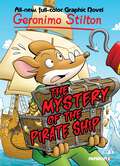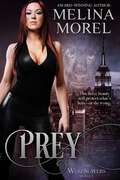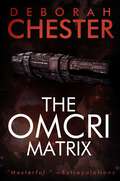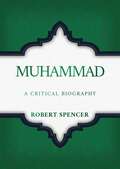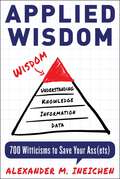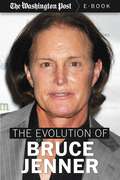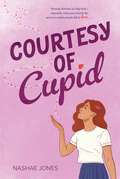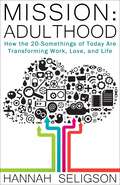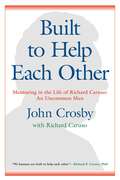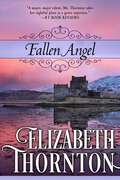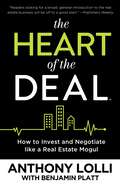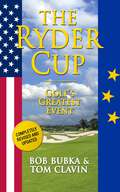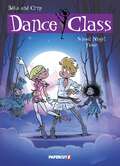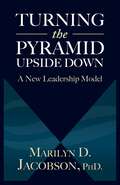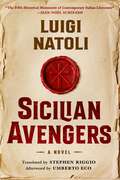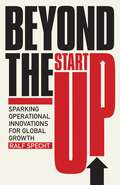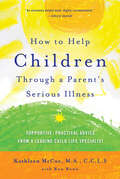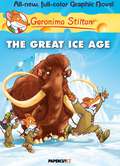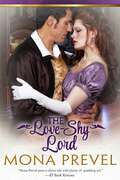- Table View
- List View
Geronimo Stilton Graphic Novels Vol. 17: The Mystery Of The Pirate Ship (Geronimo Stilton Graphic Novels #17)
by Geronimo StiltonThe Pirate Cats travel to the 18th Century to do what they do best… be pirates! So they steal an old ship sailing on the Indian Ocean to pillage the East India Company's merchant ships! It's up to Geronimo Stilton to travel through time, become a sailor, and stop the cats from changing history forever! Will Geronimo get his sea legs in time to save the day?
Prey: The Wereslayers Series - Book Two
by Melina MorelDescended from a legendary werecat demigoddess, Vivian Roussel is a modern New York businesswoman, specializing in Russian antiques. Life is wonderful until two things happen to upset her peaceful existence: unwelcome attention from the arrogant leader of her clan and a strange break-in at her warehouse involving shady werecats from a rival clan and a priceless sixteenth-century Russian icon.To deal with the burglary, Viv hires a security expert, Pavel, who quickly goes from business associate to protector and lover, breaking werecat taboos with abandon. As they battle evil factions from her clan and defend the priceless icon from depraved werecats embedded in his, Viv and Pavel find themselves fighting foes from within and without. As their love grows in the shadow of international werecat politics and dirty dealings by both clans, Viv and Pavel can only rely on each other. And their very survival now depends on it.PRAISE:"Morel returns with another terrific tale that combines paranormal politics, theft, and murder … Two intriguing protagonists make the burgeoning relationship satisfying and believable. Morel has quite the future ahead." —Romantic Times"The best kind of werecat romance … The world building is extraordinary and the author wrote the werecat universe with plenty of details, giving the reader a bird's-eye view … This is a keeper, folks, and one you definitely do not want to miss!" —Coffee Time Romance"A whirlwind ride of paranormal proportions. Melina Morel is one author to watch out for as she quickly rises to the top … For fans both old and new to the world of paranormal, you have to try this author out for yourself." —Manic Readers"Melina Morel brings both intrigue and lust together in an action-packed story … This whodunit will keep you on the edge of your seat from start to finish … Ms. Morel brings out the very best in romance and drama, making Prey a very memorable story." —TwoLips Reviews
Sweetheart of the Rodeo
by Vivian Vaughan"[Vivian Vaughan] can always be counted on to deliver a moving, tender romance." —AFFAIRE DE COEUR Catarina Ramériz, daughter of a ranch cook, wanted nothing more than to marry her oldest friend Monte Ballou. But the morning after he proposes, he disappears, along with Catarina's hope for a future with true love. Six years later, Monte has returned, determined to ride a dangerous stallion in the Fourth of July Rodeo. Still deeply in love with her childhood sweetheart, Catarina vows to do whatever necessary to stop Monte from riding the ferocious horse—and maybe save his life. But even as buried feelings and forgotten promises find their way back to the surface, Monte is promised to someone else. Will Monte and Catarina find their way back to each other before their love is extinguished forever?
The Omcri Matrix
by Deborah Chester Jay D. BlakeneyFrom the national bestselling author. "Masterful." —EXTRAPOLATIONS In the Planet Patrol, Costa was the best. The smartest, toughest, most ambitious officer in the ranks. Until the day the Omcri—a deadly alien force of faceless assassins—kidnapped the Kublai of Drugh, killing Costa's patrol but leaving her alive. The brass think Costa has sold out. And now she's on the run, desperately trying to clear her name. Her search for the truth will lead her from the back alleys of her own planet to the savage dangers of unknown worlds—and finally, into the dark heart of the Omcri Matrix.
Muhammad: A Critical Biography
by Robert SpencerMuhammad: What can we really know about him?We know a great deal about Muhammad—or so it seems. Islamic tradition contains an astonishing wealth of information about the founding figure of the Islamic faith, and most historians take for granted that this material is generally reliable.In his latest book, historian and Islamic scholar Robert Spencer shows that there is no agreement in the earliest Islamic sources about the most fundamental details of this towering figure&’s life. There are conflicting accounts of key details of his life, including the circumstances and contents of the first revelation he claimed to have received from Allah; the year of his birth; the length of his prophetic career; the name of the angel who supposedly appeared to him; and even his own name.Muhammad: A Critical Biography takes a detailed look at the Islamic traditions regarding Muhammad and lays bare their contradictions, inconsistences, and incoherence. Spencer continues the groundbreaking research he began in The Truth About Muhammad and Did Muhammad Exist?, exposing the shocking reality of how shaky Islam&’s foundations really are. He meticulously explains why competing traditions may have been invented and definitively demonstrates that, contrary to the complacency of establishment historians, the Muhammad of Islam is more legend than history, more fable than fact.Muhammad: A Critical Biography does the work that mainstream academics—who are either bought by Saudi Arabia or Qatar, or too afraid to depart from the herd—should have done long ago. Not for the faint-hearted, this book will do nothing less than rock the Islamic world to its very core.
Applied Wisdom: 700 Witticisms to Save Your Assets
by Alexander IneichenApplying wisdom and avoiding foolishness are two sides of the same coin. Slipping away from either can lead to risky and uncertain situations. Luckily, author Alexander Ineichen has been collecting witticisms for thirty-five years that have made him successful in his career and life. In Applied Wisdom, he collects an anthology of wit and wisdom containing over 700 quotations from sources as wide ranging as Thomas Aquinas and Frank Zappa. He provides entertaining food for thought for businesspeople and the general audience alike, and enables readers to think outside the box to find wisdom. These nuggets, along with his commentary for each, are the valuable words needed for those facing risk and uncertainty. The witticisms provide a full range of being level-headed, truth seeking, brutally heretical, wonderfully insightful, refreshingly politically incorrect, and other intellectual treats and provocations. The advice, blending economics, politics, history, philosophy, psychology, risk management, and much more, provides a winning mix of humor, intellectual heft, and economic survival tips.
The Evolution of Bruce Jenner
by The Washington PostBruce Jenner captured America's attention by shattering world records in the Decathlon at the 1976 Summer Olympics. Launched onto the world stage, Jenner was young, photogenic, All-American. He humbly accepted the adulation of a nation, and has stayed a household name ever since, even more so in recent years as the patriarch of one of America's most famous—and infamous—families, the Kardashian / Jenner clan. Almost forty years later, the press has been covering Jenner's transition from male to female, and should he come out publicly, it would make him the highest-profile person ever to come out as transgender. Living life proudly and openly, Jenner would serve as a role model for much of the transgender community. But not for all. His path has been controversial, as some advocates see the celebrity glare given off by his connection to the Kardashian family as exploitative, and his public persona making him a less-than-ideal spokesperson for transgendered people. Bruce Jenner, who seemingly always being watched by crowds, now finds himself more scrutinized than ever.
Courtesy of Cupid
by Nashae JonesFor the first printing only! This paperback features sprayed edges while the special edition supply lasts. In this &“sweetly romantic coming-of-age story with fun, magical touches&” (Kirkus Reviews), a girl uses her newfound ability to make people fall in love to sabotage her rival.Erin Johnson&’s thirteenth birthday unfolds like any other day, from her mom&’s quirky and embarrassing choice of outfit to racing her nemesis, Trevor Jin, to the best seat in class—front row, center. But her gifts this year include something very out of the ordinary: magical powers. Erin discovers her mysterious father is actually the love god Cupid and she&’s inherited his knack for romance. It&’s not the most useful ability for an overachiever with lofty academic and extracurricular goals…or is it? Erin desperately wants to be elected president of the Multicultural Leadership Club, and as usual, Trevor is her fiercest competition. He&’s never backed down from a challenge before, but if Erin makes him fall in love with her, maybe he'd drop out of the race and let her win. With her magical pedigree, wrapping Trevor around her finger is a snap, and having him around all the time is a small price to pay for victory. But without their cutthroat rivalry bringing out the worst in each other, Erin realizes Trevor may not be as bad as she thought, and suddenly her first foray into love gets a lot more complicated…
Mission: How the 20-Somethings of Today Are Transforming Work, Love, and Life
by Hannah SeligsonGen Y has been picked apart by analysts, statistics, and trend reports, which often portray 20-somethings in negative, one-dimensional terms like "entitled" and "whiners". In this thought-provoking new book that aims to dispel these stereotypes, journalist Hannah Seligson chronicles the lives of seven individuals who embody this generation, exploring their challenges and ambitions in vivid detail and sketching a picture, through their eyes, of what life is actually like for young adults. Through these first-hand stories, readers will discover the transformational effect this enterprising, open-minded, innovative, and diverse generation is having on society."Zeitgeist reporter Hannah Seligson details this new path to adulthood in a book that promises to be illuminating, surprising, and provocative— both for Gen Y readers themselves and for people who want to understand this charming yet sometimes infuriating generation. I need this book. What is "nexting" and "jacked"? —Gretchen Rubin, New York Times Bestselling Author of THE HAPPINESS PROJECT and HAPPIER AT HOME
Built to Help Each Other: Mentoring in the Life of Richard Caruso: An Uncommon Man
by John C. CrosbyRichard Caruso and John Crosby started the Uncommon Individual Foundation in 1986 with the belief that mentoring was the key to unlock human potential and individual growth, paving the way to meaningful and productive lives. Caruso envisioned a book revealing the importance of mentoring in his own life, and now his partner, Crosby, takes up the mantle to share it as a way to inspire others to achieve their own goals.
Fallen Angel
by Elizabeth ThorntonFrom the USA TODAY bestselling author."I consider Elizabeth Thornton a major find." —Mary Balogh, NEW YORK TIMES bestselling author of ONLY ENCHANTINGBeautiful, fiery Scotswoman Maddy Sinclair held one man responsible for the scandal and tragedy that ruined her family: Viscount Deveryn, better known as The Fallen Angel. But when Maddy fell blindly into his powerful embrace, she was unaware the man who kissed her so skillfully was her sworn enemy. Now it is much too late, for though her heart may be lost, her will to foil Deveryn's scheme to steal her legacy is stronger than ever. Deveryn had his sights set on Maddy's castle and her tempting beauty—but not her affections. That changed as he found himself challenged by her wit, her guile, and her ability to turn the tables on his best laid plans, offering him a lesson in seduction that proved heaven does indeed exist on earth—and that perhaps only one thing can redeem a fallen angel.
The Heart of the Deal: How to Invest and Negotiate like a Real Estate Mogul
by Anthony LolliThe founder and CEO of Rapid Realty, New York City&’s largest rental-based real estate brokerage, shares his story, his advice, and his tips for building a successful career in the ever-growing and lucrative world of real estate. Anthony Lolli got his real estate license at age nineteen. By twenty-three, he was a millionaire and the head of a swiftly growing company that would become one of the largest real estate brokerages in New York and a national franchise sensation. Now, he&’s sharing the secrets behind his success. Filled with insights into Lolli&’s inspirational rags-to-riches rise to the top and bursting with practical advice for real estate newcomers and veterans alike, The Heart of the Deal is essential reading for anyone with big dreams and the drive to make them come true. Learn how to set smart goals, negotiate like a pro, analyze properties and neighborhoods, overcome objections, and much more. Whether you want to become a top-performing broker or a savvy property investor, or simply master real estate management tactics designed to help you achieve your financial goals, Lolli&’s grounded guidance will put you on the right path. Most importantly, The Heart of the Deal will teach you how to utilize all of these strategies to build a lucrative career without sacrificing your humanity in the process. At all times, Lolli keeps one central premise in mind: that the heart of every deal isn&’t money—it&’s people.
The Ryder Cup: Golf's Greatest Event
by Tom Clavin Bob BubkaRevised and updated, this in-depth look recounts The Ryder Cup's rich history and venerated place in sports, its champions and its characters, and its status as golf's greatest grudge match. From its humble origins in 1927 to its place today as golf's most gentlemanly battle—and a multi-million-dollar international sports event—The Ryder Cup has cemented its place in both its legacy and lore. Golf journalist Tom Clavin and golf commentator Bob Bubka have now made current their seminal work on the tournament, exploring the history and the rivalries, the extraordinary triumphs and devastating defeats, and the U.S. and the European contingents who have made this contest so remarkable. The names are legendary for any fan of golf: Palmer, Nicklaus, Jacklin, Floyd, Mickelson, Ballesteros, Faldo, Hogan, Nelson, Watson, Strange, Sarazen, Crenshaw, Woods, Montgomerie…the list goes on, as do their pitched battles for dominance and accomplishments on the greens. This up-close and personal look at The Ryder Cup is a must-read for golf fans, especially in preparation for the landmark 40th Anniversary tournament in Gleneagles, Scotland, in 2014.
When We Were Us: Keeping Score Trilogy Book One (Keeping Score Trilogy #1)
by Tawdra KandleAll's fair in love and football.The Trio. That&’s who we&’ve been since birth: Nate, Leo . . . and me, Quinn. Our mothers met in prenatal yoga and became best friends, which meant that the three of us hit every milestone together, from the first day of school to the very first kiss. We&’ve always known that Nate&’s a little different. He&’s not as strong as Leo or me; he spent a lot of our childhood in various hospitals. Leo and I have been his unofficial bodyguards all our lives. I thought that would always be true. But time moves on, and everything shifts. People change, and sometimes friendships fade away. High school pulled us apart: Leo&’s suddenly the most popular guy in school, a football star and the object of every girl&’s fantasy. Nate and I are just people he used to know, the ones he left behind. Of course, since I&’ve been in love with Leo from the time we were eight, that stings a little. And to complicate matters, I know that Nate is hung up on me. I see the look in his eyes. I wish I could say I felt the same, but I don&’t. It's getting harder and harder to keep him in the friend zone, though. Then Leo and I were thrown together again, sticking up for Nate. I was surprised Leo came through for us and even more shocked when he kissed me. Me! Am I finally getting my chance with Leo . . . and will it come at the risk of losing both my best friends? ***This is Book #1 of a trilogy, and it does include an unresolved ending. ***
Dance Class Vol. 7: School Night Fever (Dance Class Graphic Novels #7)
by BekaThe national competition is coming up fast, and Julie, Lucie, and Alia will need all their skills, all their poise, and a lot of grit and determination to get their routine in perfect shape.The always jealous, ever-scheming Carla is trying to sabotage everything again, but the girls are used to that; what they weren't expecting was their teacher, Mary, falling sick at the worst possible moment! As they struggle to choreograph something on their own for the first time, it may be up to Lucie to step up and save the day.
The Wedding Portrait
by Fiona Hill"...considerably more wit and pizazz than the legendary Georgette [Heyer] herself." —Kirkus Reviews Lady Laura consents to give her hand to Thaddeus Grey, a man she has known all of her life. Perhaps there is some romantic ingredient missing from their relationship, but Thad is still an attractive man and a dear friend… As the wedding festivities were set to begin at Harkness Abbey the wedding gifts came pouring in, and the Baron Nathaniel Lowland, an old friend of Laura's father, sent the most surprising gift of all—his son Ashley. A painter of exquisite talent, Ashley has been sent to paint Lady Laura's portrait. It could hardly be expected that he would come to capture her heart as well.
Hard Love
by Joanne SchwehmNoah Winston&’s life was perfect. He had it all: striking looks, more money than he could ever spend, good friends, and any woman he wanted.Margo Perry&’s life wasn&’t perfect, but it was her own. She didn&’t need a man to make her happy or feel better about herself. Then he saw her – a gorgeous, rain-soaked stranger – but she wasn&’t a stranger at all. They&’d known each other a lifetime ago, when she was just a girl. Now, she was all woman.Then it happened. The man she had spent her teenage years lusting over rescued her on a bleak yet fateful day. There he was, straight out of her dreams, looking better now than he had years ago.The more time he spent with her, the more he questioned everything he knew.The more time she spent with him, the more those old feelings resurfaced and grew stronger.Too bad it only took one night, a few words, and a terrible decision, to ruin it all.Too bad it was too good to be true.
Turning the Pyramid Upside Down: A New Leadership Model
by Marilyn D. Jacobson"The upside down pyramid is particularly important in customer facing organizations ... a good read for any leader."—Jim Estill, Partner at CanRock Ventures, owner of CEO Blog, Time Leadership Globalization and hyper-connectivity are significantly affecting the way all organizations are led, requiring a shift in both leadership approaches and the organization's context/culture. Leadership attributes and behaviors must move from a concentration on what I need to do to what WE must do, if the organization is to succeed. Leaders need to focus on ensuring that within the organization, there is a high degree of engagement. Flat organization structures, operating without command and control hierarchies, will be better able to respond effectively to this new complex, fast-paced, global environment. Through discussions with industry leaders and drawing on her years of consulting and coaching experience, Marilyn Jacobson covers the necessary tools needed in both leadership approach and organization culture to make these adjustments. Jacobson provides examples of positive organizational changes leaders can make to tackle future challenges, highlighting engagement and adaptability as keys to success in this complex, fast-paced, global environment.
Sicilian Avengers: A Novel (Books One & Two) (Sicilian Avengers)
by Luigi NatoliA thrilling Sicilian saga about the legendary secret sect purported to be forerunners of the Mafia, translated into English for the first time. Emerging from the dark streets and subterranean caves of Palermo, the Beati Paoli, masked and hooded, mete out their own form of justice to counter the unfettered power and privilege wielded by the aristocracy. For the voiceless, weak, and oppressed, the Beati Paoli are defenders and heroes. Reminiscent of a Dumas novel, Sicilian Avengers is a vibrant, atmospheric fresco of early eighteenth-century Palermo. Onto the stage of the ancient city, Blasco da Castiglione, a bold, brash, orphan adventurer, arrives on a quest to discover his origins and seek his destiny. But this fearless, swashbuckling D&’Artagnan-esque hero unwittingly gets caught up in a devious and murderous succession plot involving a powerful noble family. When the Beati Paoli hear about this plot to usurp a rightful inheritance, they spring into action. Their shadowy machinations entangle the charismatic Blasco, who crosses paths with a cast of characters that test his loyalty and resolve in the pursuit of his true identity. The historical accuracy of the novel is complemented by the most meticulous description of Sicily&’s capital city ever written. Action-packed and laced with intrigue and chivalrous duels, Sicilian Avengers is a tale of love and hatred, friendship and betrayal, suffering and retribution. As French critic Jean Noël Schifano said, Natoli's novel is &“the fifth historical monument of contemporary Italian literature.&” This eBook includes the full Book One and Book Two saga plus an afterword by Umberto Eco.
Beyond the Startup: Sparking Operational Innovations for Global Growth
by Ralf SpechtThe greatest challenge of any startup and growth company is the transition from an early stage startup to a robust organization complete with a driving culture, contemporary leadership, organizational infrastructure and twenty-first-century operating methodologies. Ralf Specht provides inspiration, wisdom, and learnings gleaned from his role and experience in creating and scaling Spark 44, a Jaguar Land Rover joint venture, from concept to an award- winning global marketing communications company with well over a thousand employees in 18 countries in a few short years. In the high interest topic of startups focused on the beginning stages of entrepreneurship, Beyond the Startup fills a void in the entrepreneurial discussion on how to scale a second stage startup laying out, in practical terms, the tools and practices that made Spark44 a global powerhouse.
Sicilian Avengers: A Novel (Books One & Two) (Sicilian Avengers)
by Luigi NatoliFull length, standalone sexy romantic comedy about Keane Morgan (introduced in The Club series) and Maddy Milliken (sister to a The Club series supporting character).A thrilling Sicilian saga about the legendary secret sect purported to be forerunners of the Mafia, translated into English for the first time. Emerging from the dark streets and subterranean caves of Palermo, the Beati Paoli, masked and hooded, mete out their own form of justice to counter the unfettered power and privilege wielded by the aristocracy. For the voiceless, weak, and oppressed, the Beati Paoli are defenders and heroes. Reminiscent of a Dumas novel, Sicilian Avengers is a vibrant, atmospheric fresco of early eighteenth-century Palermo. Onto the stage of the ancient city, Blasco da Castiglione, a bold, brash, orphan adventurer, arrives on a quest to discover his origins and seek his destiny. But this fearless, swashbuckling D&’Artagnan-esque hero unwittingly gets caught up in a devious and murderous succession plot involving a powerful noble family. When the Beati Paoli hear about this plot to usurp a rightful inheritance, they spring into action. Their shadowy machinations entangle the charismatic Blasco, who crosses paths with a cast of characters that test his loyalty and resolve in the pursuit of his true identity. The historical accuracy of the novel is complemented by the most meticulous description of Sicily&’s capital city ever written. Action-packed and laced with intrigue and chivalrous duels, Sicilian Avengers is a tale of love and hatred, friendship and betrayal, suffering and retribution. As French critic Jean Noël Schifano said, Natoli's novel is &“the fifth historical monument of contemporary Italian literature.&” This eBook includes the full Book One and Book Two saga plus an afterword by Umberto Eco.
How to Help Children Through a Parent's Serious Illness: Supportive, Practical Advice from a Leading Child Life Specialist
by Kathleen McCueHow to Help Children Through a Parent's Serious Illness has become the standard work on an important subject. A classic for over fifteen years, it continues to be a go-to book for supportive, practical advice, based on the lifetime experience and clinical practice of one of America 's leading child life practitioners. Fully revised and updated, this new edition also explores the major issues and developments from the last decade that affect children today, including the dangers and opportunities of the Internet, a deeper understanding of how hereditary diseases affect children, the impact of the nation's explosive growth in single-parent families, and new insights into how family trauma and a parent's mental illness may affect children.
Geronimo Stilton Graphic Novels Vol. 5: The Great Ice Age (Geronimo Stilton Graphic Novels #5)
by Geronimo StiltonThe popular children&’s story appears in graphic novel form for the first time in the U.S., with stories never seen in America. Geronimo Stilton is a talking mouse who lives in New Mouse City on Mouse Island with his friends and relatives. He works at The Rodent&’s Gazette, the most famous newspaper in New Mouse City. In this series of comics, Geronimo Stilton travels through time in order to defend history from his arch nemeses, the Pirate Cats. These devious felines plan to travel back in time in order to change history to make them supreme rulers of Mouse Island!
Marielle: The French Maiden Series - Book One
by Sylvia Halliday"Sylvia Halliday spins a marvelous tale." —RT BOOK REVIEWS Armed only with her wavering courage and her fear that her brother has been captured during the Huguenot uprising against Louis XIII, Marielle Saint-Juste enters the Rebel prison to search him out. But it isn't her wounded brother she finds, but a mysterious stranger—and her destiny. In the darkest shadows of a French dungeon, love illuminates a brilliant path for two hearts. Marielle and Andre will face their deepest fears and trials, but their lives will be forever changed.
The Love-Shy Lord
by Mona PrevelTheir match was impossible, but their love was inevitable. Too tall for a society woman, Clarissa has no potential suitors—not that she needs any. She only has eyes for Marcus, viscount of Fairfax. But as a steward's daughter, Clarissa is hardly a suitable match for Marcus.Marcus Ridley is far too appealing—and eligible—for his own good. Restlessly pursued by desperate maidens, his view of women and marriage is skewed. But then he meets Clarissa, who steals his heart with a single kiss.Suddenly, Marcus can't get Clarissa off of his mind, and the high-society lord finds himself desperate to make the steward's daughter his wife.
